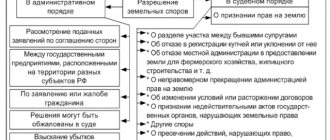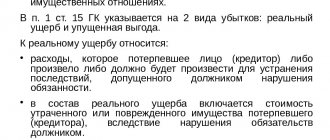Normative base
According to the Constitution of the Russian Federation, everyone has the right to defend their honor and good name in court. Such protection is implemented through Art. , clause 5 art. 19, art. 150, 152, 1099, 1100, paragraph 3 of Art. 1251, paragraph 2 of Art. 1266 Civil Code, Arbitration Procedure Code and Civil Procedure Code.
The Constitution of the Russian Federation guarantees that everyone can express their opinions and beliefs in any legal way, without violating the rights and freedoms of other persons. The court is required to balance the rights to freely express views and the rights to protect one's business reputation for any person.
When resolving cases of this category, courts (of general jurisdiction or arbitration) are guided by clarifications from the decisions of the plenum of the Supreme Court of the Russian Federation, clarifications from the decisions of the plenum of the Supreme Arbitration Court of the Russian Federation, decisions of the Constitutional Court of the Russian Federation, international legal acts:
- the Universal Declaration of Human Rights;
- the Covenant on Civil and Political Rights;
- Convention for the Protection of Human Rights and Fundamental Freedoms.
To exercise the right to defense, a claim is prepared to protect the business reputation of a legal entity, taking into account:
- Art. 23 of the Constitution of the Russian Federation;
- Art. 15 subsection 2 ch. 6, 7, 8 (under Article 152) of the Civil Code;
- Law of the Russian Federation of December 27, 1991 No. 2124-1 “On the Mass Media” (Article 2, 43-46 and especially 57);
- resolutions of the plenum of the Armed Forces of the Russian Federation dated February 24, 2005 No. 3 and dated June 15, 2010 No. 16.
Protecting a citizen’s business reputation – whose jurisdiction?
An article about beer beer was published in the electronic media. The only participant in the plant filed a lawsuit in the district court at the location of one of the defendants to protect his business reputation. However, no claim was filed to protect the plant’s business reputation.
Considering that there is an economic dispute here - information disseminated in the media relates to the business activities of the plant - the defendants filed a motion to terminate the proceedings under Art. 220 Code of Civil Procedure of the Russian Federation.
However, the court refused to satisfy it, indicating that “taking into account the nature of the disputed information and the subject composition, the court comes to the conclusion that the stated claims do not fall under the category of disputes on the protection of business reputation considered by arbitration courts.”
At the same time, the court itself cited the provisions of paragraph 3 of the Resolution of the Plenum of the Supreme Court of the Russian Federation dated February 24, 2005 No. 3 “On judicial practice in cases of protecting the honor and dignity of citizens, as well as the business reputation of citizens and legal entities,” which refers to paragraph 5 Part 1 Art. 33 of the Arbitration Procedural Code of the Russian Federation and confirms that special jurisdiction has been established for arbitration courts in cases of protection of business reputation in the field of business and other economic activities. Moreover, in accordance with Part 2 of this article, these cases are considered by arbitration courts, regardless of whether the parties to the legal relations from which the dispute or claim arose are legal entities, individual entrepreneurs or other organizations and citizens. Based on this case, the protection of business reputation in the field of business and other economic activities is not within the jurisdiction of courts of general jurisdiction.
Later, changes were made to the Arbitration Procedure Code of the Russian Federation, and clause 5, part 1, art. 33 of the Arbitration Procedure Code of the Russian Federation is now reproduced verbatim in paragraph 7 of part 6 of Art. 27 Arbitration Procedure Code of the Russian Federation. At the same time, in the new edition, the Arbitration Procedure Code of the Russian Federation itself places emphasis: “Regardless of whether legal entities, individual entrepreneurs or other organizations and citizens are participants in the legal relations from which a dispute or claim arose, arbitration courts consider cases on the protection of business reputation in sphere of entrepreneurial and other economic activities.”
However, the judge was confused by clause 5 of this Resolution, according to which the proper defendants in claims for the protection of honor, dignity and business reputation are the authors of untrue defamatory information, as well as the persons who disseminated this information. If the disputed information was disseminated in the media, then the author and editors of the relevant media are the proper defendants (clause 5 of the Resolution).
Obviously, only a citizen can be the author, therefore, both the law and the Supreme Court initially spoke about cases when not only the plaintiff, but also the defendant would be citizens. And still, in this case, arbitration courts will have jurisdiction.
But how can this be explained to the district court?
Ways to protect business reputation
According to Art. 152 of the Civil Code, business reputation is protected from information discrediting it:
- refutation (part 1-2). Publications in the media are refuted by the same media. If its publication is terminated, the court has the right (according to paragraph 13 of the resolution of the plenum of the Supreme Court of the Russian Federation of February 24, 2005 No. 3) to oblige the culprits (editorial staff, founder, author) to refute the publication at their expense in another media outlet. Similarly under Part 2 of Art. 152 publication of the victim’s response is also permitted;
- replacement or withdrawal of a document from the organization (Part 3). The body or person who previously sent it replaces or revokes the disputed document;
- deletion of information: on the Internet with the prohibition and suppression of its further dissemination (parts 4-5), destruction of information media without compensation (only in the absence of other options for deleting data). On the Internet, it is allowed to delete and refute data with the refutation communicated to users;
- recognition of disseminated information as untrue (Part 8), when its author and distributor cannot be identified;
- coverage of material losses from the transfer of harmful information (Part 9), upon proof that there is a cause-and-effect relationship between the transfer and losses (under Article 1064 of the Civil Code) and simultaneously with a refutation or response and compensation for moral damage (under Article 151) . The latter compensation is not available to legal entities;
- judicial recognition of the fact of violation (clause 2 of Article 150 of the Civil Code).
The business reputation of the deceased is protected by interested parties (Part 1 of Article 152), and the reorganized legal entity is protected by its legal successors or founders (resolution of the Federal Arbitration Court of the Volga-Vyatka District dated August 29, 2013 in case No. A43-26790/2012).
Legislative regulation of the issue of protecting business reputation
Any individual or legal entity has the right to protect its reputation by all legal means and means available to it.
Regulation of issues of reputation protection is carried out in accordance with Art. 152 of the Civil Code of the Russian Federation. The rules on the protection of business reputation set out in our article are equally applied to protect the reputation of citizens and legal entities, with the exception of compensation for moral damage (clause 11 of Article 152 of the Civil Code of the Russian Federation).
Although in paragraph 1 of Art. 152 of the Civil Code of the Russian Federation states that every person has the right to “demand in court” a refutation of information discrediting his business reputation; this does not deprive victims of the opportunity to defend themselves out of court. Extrajudicial protection of business reputation is regulated, among other things:
A significant number of issues relating to the judicial protection of the business reputation of legal entities are clarified:
Where to file a claim
According to clause 7, part 6, art. 27 of the Arbitration Procedure Code, cases on the protection of business reputation in business and other economic activities are considered and resolved by arbitration courts (relevant for any legal entities and individuals). If business reputation is protected outside of business and other economic activities, the claim is filed in a district court of general jurisdiction. This happens when:
- a non-profit organization that does not pursue profit is protected (bar association, etc.) (resolution of the Federal Arbitration Court of the Moscow District dated April 14, 2015 in case No. A40-48978/14);
- information relates to the organizational and managerial activities of a person (information about the plaintiff’s harassment of someone in his work) (resolution of the Federal Arbitration Court of the North-Western District dated January 15, 2013 in case No. A56-25599/2012);
- the information relates to labor relations with specific persons (resolution of the Federal Arbitration Court of the Ural District dated July 6, 2012 in case No. A60-37772/2011);
- the data concerns the activity of creating something (resolution of the Ninth Arbitration Court of Appeal dated March 14, 2013; 09AP-41886/2012-GK);
- in other similar cases.
For individual entrepreneurs, it is determined who needs protection: an entrepreneur or an individual.
Before filing a claim for the protection of business reputation on the Internet, record the controversial content of a specific Internet page with its address, date and time (screenshot) and have it certified by a notary. Indicate the time the screenshot was taken and printed and information about who performed these actions. If defamatory information posted on an Internet site is found by a court to be untrue, the owner of the site or another person authorized by him who posts information on this site is obliged to remove such information at the request of the victim.
Claims are filed at the place of residence or address of the defendant, in cases from Art. 29 Code of Civil Procedure and 36 Code of Arbitration Procedure the place is chosen by the plaintiff. The defendants are the authors of false information and their distributors. When they are not established, the case is resolved through special proceedings (Chapter 27, 28 of the Civil Procedure Code or 27 of the Arbitration Procedure Code) at the applicant’s place of residence.
According to Art. 208 of the Civil Code, there is no statute of limitations. For information in the media (under Part 10 of Article 152 of the Civil Code) it is one year from the date of publication.
The composition, amount and distribution (between the parties) of legal costs are determined according to Chapter. 7 of the Code of Civil Procedure in a court of general jurisdiction, and in an arbitration court - under Ch. 9 APK.
Claim for protection of business reputation of a legal entity
Claims for the protection of the business reputation of legal entities related to entrepreneurial and other economic activities are considered by the arbitration court. The subject composition of the dispute in this case does not matter (clause 3 of PPVS No. 3, clause 2 of the Review of Practice on Business Reputation).
As a general rule, in a statement of claim for the protection of business reputation, it is necessary to describe and prove the circumstances on which the claims are based, namely:
- Indicate what specific information, in the plaintiff’s opinion, discredits his business reputation. Moreover, it is important to name not the judgment or opinion of the author or journalist, but the factual statements underlying these judgments (even if the latter are stated as an assumption).
- Confirm that the information has been disseminated. It is necessary to specify where and when the defamatory information appeared.
- Justify that the disseminated information relates specifically to the plaintiff and that it was disseminated by the person against whom the claims are made.
- Prove that the information is defamatory. An expert opinion is best suited for this.
The plaintiff does not have to deny the information. In this case, there is a presumption according to which disseminated defamatory information is considered untrue (clause 9 of PPVS No. 3).
All other facts must be confirmed by relevant evidence (audio and video recordings, notarized inspection reports, witness statements, expert opinions).
The limitation period does not apply to this category of cases, with certain exceptions (Article 208 of the Civil Code of the Russian Federation).
Note! Requirements related to the publication in the media of any untrue information can be challenged within a year from the date of publication (Clause 10, Article 152 of the Civil Code of the Russian Federation). A similar period is provided for appealing a media outlet’s refusal to publish a refutation or response (Articles 43, 44 of the Media Law).
Drawing up a statement of claim
According to Art. 125 - 126 of the Arbitration Procedure Code (if you file in an arbitration court) or 131 - 132 of the Code of Civil Procedure (when you file in a court of general jurisdiction), constitute a claim for the business reputation of a legal entity, person, individual entrepreneur. The text of the application to the arbitration court must contain the following information:
- The name of the court where the claim is filed.
- About the plaintiff: name with address, for a citizen - place of residence, date and place of birth, place of work or date and place of state registration as an individual entrepreneur, telephone numbers, faxes, email addresses.
- About the defendant: for a citizen - full name. (if available) and place of residence, plus date and place of birth, place of work (if known) and one of the identifiers (SNILS, INN, passport series and number, OGRNIP, driver's license series and number, vehicle registration certificate series and number ), for an organization - name and address, plus INN and OGRN, when known.
- Claims against the defendant with reference to laws and other regulatory legal acts. When there are several defendants, the requirements for each of them.
- Circumstances - the grounds for claims with supporting evidence.
- Cost of claim, if assessed.
- Calculation of money collected.
- Information about the plaintiff’s compliance with pre-trial procedures when money is being recovered and the dispute arose from an agreement, other transaction, or unjust enrichment.
- Data on the conciliatory actions taken by the party (parties), if any.
- A set of application documents under Art. 126 APK.
In general, the structure (under Article 131 of the Civil Procedure Code) of a claim in a court of general jurisdiction is similar. Pre-trial procedure is optional.
Features of protecting the business reputation of legal entities
On August 17, the RF Armed Forces adopted an act that should serve as a guide for the courts when considering cases of compensation for moral damage to legal entities (Determination of the RF Armed Forces dated August 17, 2015 No. 309-ES15-8331; hereinafter referred to as the Determination).
The Civil Code of the Russian Federation in its original version and up to October 1, 2013 (Federal Law of July 2, 2013 No. 142-FZ) contained a provision that a legal entity in respect of which information discrediting its business reputation has been disseminated, has the right, along with by refuting such information, demand compensation for losses and moral damages (clause 5, clause 7 of Article 152 of the Civil Code of the Russian Federation in the original wording). In this regard, an indication of a similar right of organization also appeared in judicial practice (clause 11 of the Resolution of the Plenum of the RF Armed Forces of August 18, 1992 No. 11, clause 15 of the Resolution of the Plenum of the RF Armed Forces of February 24, 2005 No. 3).
At the same time, the positions of the highest judicial authorities on this issue were not clear.
Thus, the Supreme Arbitration Court of the Russian Federation pointed out that moral harm is physical and moral suffering, and based on the meaning of Art. 151 of the Civil Code of the Russian Federation, it can only be caused to a citizen, but not to a legal entity (Resolution of the Presidium of the Supreme Arbitration Court of the Russian Federation of August 5, 1997 No. 1509/97, Resolution of the Presidium of the Supreme Arbitration Court of the Russian Federation of December 1, 1998 No. 813/98). The Supreme Arbitration Court of the Russian Federation guided the courts to the fact that the business reputation of a legal entity is protected by refuting disseminated information and compensating for losses, but not through compensation for moral damage.
In turn, the Constitutional Court of the Russian Federation clarified that legal entities are not deprived of the right to make claims for compensation for losses, including intangible ones, caused by derogation of business reputation (Definition of the Constitutional Court of the Russian Federation of December 4, 2003 No. 508-O) “At the same time, the Constitutional Court of the Russian Federation did not identify the concepts of “moral damage” and “intangible damage caused to a legal entity.” This is true, since compensation for moral damage is recovered when physical and moral suffering occurs, while compensation for non-material damage is sought when business reputation is diminished, which does not necessarily entail physical and moral suffering for the plaintiff.”
However, since the Civil Code of the Russian Federation, as already indicated, extended all the rules on the protection of the honor and dignity of citizens to the protection of their business reputation by companies, this position of the Constitutional Court of the Russian Federation, not fully defined in terminology, gave legal entities the opportunity to demand compensation for moral damage caused to them - and not only when resolving cases on the protection of business reputation, but also in cases of other categories. “The plaintiffs were convinced that if such harm is possible in one case, then why shouldn’t it be possible in other cases. Most often, companies made such demands due to the inaction of bailiffs, who for a long time did not take any action to execute the judicial act.”
On October 1, 2013, amendments to the Civil Code of the Russian Federation came into force, eliminating any doubt that such a method of protecting civil rights as compensation for moral damage can only be applied to an individual. And in paragraph 11 of Art. 152 of the Civil Code of the Russian Federation now directly states that the same rules apply to the protection of a company’s business reputation that apply to the protection of citizens’ rights, with the exception of provisions on compensation for moral damage.
However, even after the amendments, judicial practice continued to vary, and for good reason. Particular attention should be paid to the fact that, when satisfying the demands of legal entities for compensation for moral damage, the courts were based primarily on Part 4 of Art. 15 of the Constitution of the Russian Federation on the priority of international norms over national ones (resolution of the Seventeenth Arbitration Court of Appeal of October 6, 2014 No. 17AP-11420/14). The fact is that the Convention for the Protection of Human Rights and Fundamental Freedoms, ratified by Russia, does not exclude the possibility of compensation for moral damage to organizations. This is reflected in international practice, in particular, in the practice of the European Court of Human Rights. As for refusals to satisfy demands, they were based on the provisions of paragraph 11 of Art. 152 of the Civil Code of the Russian Federation indicating the impossibility of collecting moral damages. The courts often used the reasoning of the Supreme Arbitration Court of the Russian Federation and emphasized that a legal entity, due to the peculiarities of its legal status, is deprived of a real opportunity to experience physical and moral suffering (resolution of the Fifteenth Arbitration Court of Appeal dated July 24, 2015 No. 15AP-9283/15).
That is why lawyers were so impatiently waiting to see how the RF Armed Forces would resolve the current conflict between Russian and international law. However, the Determination introduced by the Court did not address this issue. However, the RF Supreme Court emphasized that the rules on moral damage do not apply to legal entities.
Let's consider this matter in more detail.
Based on the court decision (decision of the Arbitration Court of the Perm Territory dated January 27, 2014 No. A50-15334/2013), the company received a writ of execution to collect debt from the individual entrepreneur Sh. in the total amount of 99,333.07 rubles.
On March 17, 2014, the writ of execution was sent to the bailiffs and received by them on March 27, 2014. On May 5, 2014, the company sent a request to the bailiffs about the progress of the enforcement proceedings. Having received no response, on August 27 of the same year the applicant contacted the bailiff service with a repeated request.
Since both requests were ignored by the FSSP of Russia, the company filed a lawsuit to recover 49,666.53 rubles from the state. for compensation for moral damage. Satisfying the stated requirements, the court of first instance concluded that the plaintiff was in a state of uncertainty, which justifies awarding him such compensation (decision of the Arbitration Court of the Perm Territory dated December 17, 2014 in case No. A50-21226/2014). This position was supported by the following arguments.
One of the main tasks of enforcement proceedings is the correct and timely execution of judicial acts (Article 2 of the Federal Law of October 2, 2007 No. 229-FZ “On Enforcement Proceedings”). And harm caused to a legal entity as a result of the inaction of state bodies, local government bodies or officials of these bodies is subject to compensation from the corresponding budget (Article 1069 of the Civil Code of the Russian Federation).
As for the validity of the claims for compensation for moral damage to the plaintiff, the court drew attention to the fact that an integral part of the Russian legal system is the Convention for the Protection of Human Rights and Fundamental Freedoms, including the practice of the European Court of Human Rights (Article 15 of the Constitution of the Russian Federation). Thus, in the judgment of the European Court of Human Rights dated April 6, 2000 in the case “Case “Comingersoll S.A.” (Comingersoll SA) v. Portugal, it was noted that the court cannot exclude the possibility of awarding compensation for moral damages to a commercial organization, since prolonged uncertainty arising from the failure of a third party to fulfill its obligations within a reasonable time must cause the company, its directors and shareholders significant inconvenience.
Thus, the European Court of Human Rights, when determining the issue of compensation to a legal entity for a violated intangible benefit, does not proceed from the fact of physical and moral suffering of the legal entity, but from the fact of prolonged uncertainty in making a particular decision. It was this argument that was accepted as the basis by the court of first instance.
Since the plaintiff was not notified for a long period of time about the measures aimed at executing the judicial act, the court concluded that the company was in a state of uncertainty, and this fully justifies the award of compensation to it.
The amount of compensation for moral damage, arbitrarily determined by the plaintiff as 50% of the amount of debt under the writ of execution, amounted to 49,666.53 rubles. The court found this requirement proportionate and found no grounds for reducing it.
The appellate and cassation instances recognized the decision as legal and justified and upheld it (resolution of the Seventeenth Arbitration Court of Appeal dated February 19, 2015 No. 17AP-18311/14, resolution of the Arbitration Court of the Ural District dated May 18, 2015 No. F09-1824/ 15). However, the RF Supreme Court did not agree with the opinion of its colleagues.
Position of the RF Armed Forces
The Supreme Court of the Russian Federation considered the conclusions of the lower courts to be erroneous for the following reasons.
He recalled that in a case where moral harm is caused to a citizen, the court may impose on the offender the obligation to compensate for such harm (paragraph 1 of Article 151 of the Civil Code of the Russian Federation).
At the same time, the Court clarified that moral harm is understood as moral or physical suffering caused by actions (inaction) that encroach on intangible benefits belonging to a citizen or violate his personal non-property or property rights (paragraph 1, paragraph 4, paragraph 2 of the Resolution of the Plenum of the Armed Forces of the Russian Federation dated December 20, 1994 No. 10 “Some issues of application of legislation on compensation for moral damage”).
The Supreme Court of the Russian Federation also emphasized that moral damage is subject to compensation only in cases provided for by law (clause 2 of Article 1099 of the Civil Code of the Russian Federation).
Thus, from the literal content of the above provisions, the Court concluded that compensation for moral damage is possible only if moral damage is caused to a citizen by actions that violate his personal non-property rights or encroach on other intangible benefits belonging to him. In other cases, compensation for moral damage can only take place if there is a direct indication of this in the law.
However, since the law does not directly provide for the right of a legal entity to demand compensation for moral damage caused to it, the RF Supreme Court concluded that there were no grounds for satisfying the plaintiff’s claims.
At the same time, not all lawyers are inclined to believe that the ruling issued by the RF Supreme Court has completely closed the issue of the possibility of compensating a legal entity for moral damage. “The aforementioned definition of the Armed Forces of the Russian Federation contains an internal contradiction - on the one hand, it concludes that the legal nature of moral damage does not imply compensation for legal entities, but on the other hand, it states that there may still be some cases directly provided for by law, when compensation for moral damage to organizations is possible.”
Cases on recovery of compensation for moral damage vs. business reputation protection cases
As mentioned above, the Constitutional Court of the Russian Federation considered it possible to demand compensation for intangible losses caused to a legal entity by derogation of its business reputation (Determination of the Constitutional Court of the Russian Federation of December 4, 2003 No. 508-O). As a result, the concept of so-called “reputational” harm has appeared in judicial practice, the content of which differs from moral harm caused to an individual. A similar approach was shared by the Supreme Arbitration Court of the Russian Federation, which also determined the circumstances to be proven necessary to satisfy claims for compensation for reputational damage (Resolution of the Presidium of the Supreme Arbitration Court of the Russian Federation dated July 17, 2012 No. 17528/11).
The Court considered these circumstances to include:
– the presence of an unlawful act on the part of the defendant;
– the occurrence of adverse consequences of these actions for the plaintiff;
– a cause-and-effect relationship between the defendant’s actions and the occurrence of adverse consequences on the plaintiff’s side.
https://www.garant.ru/article/
Business reputation
On January 28, 2021, new requirements for the business reputation of managers, members of management bodies, other officials, acquirers (owners) of more than 10% of shares (stakes) (including as part of a group of persons), controllers of owners of more than 10% of shares ( shares) of credit organizations, insurance organizations, non-state pension funds, management companies of investment funds, mutual funds, non-state pension funds, as well as microfinance companies.
The law expanded the list of criteria for compliance of business reputation with established requirements.
A cross-sectoral approach to monitoring compliance with business reputation requirements of managers, members of management bodies and other officials, owners of financial organizations has been introduced.
849 complaints received
of which 394 complaints were satisfied,
on 273 complaints a decision was made to refuse satisfaction
as of 04/01/2021
Now, if a person, for example, does not meet the requirements applicable to bank officials, he will not be able to occupy management positions and buy large shares in insurance companies, non-state pension funds, management companies and microfinance companies.
For all participants in the financial market, the requirements for the procedure for acquiring large (more than 10%) blocks of shares (stakes) and establishing control over large shareholders (participants), as well as for the procedure for disclosing information about shareholders (participants) and the ownership structure have been aligned. The procedure for eliminating violations related to business reputation requirements is regulated.
In addition to requirements for business reputation, the law establishes requirements for the qualifications of officials of financial organizations, requirements for the financial position of acquirers of more than 10% of shares (stakes), as well as a number of other requirements and restrictions.
The Bank of Russia monitors compliance with these requirements.
A person whose business reputation or qualifications are recognized as not meeting the established requirements has the right to file a complaint with the Bank of Russia Commission for the consideration of complaints against decisions made by Bank of Russia officials recognizing him as not meeting the qualification requirements and (or) requirements for business reputation established by federal laws (hereinafter referred to as the Commission). The complaint must be accompanied by documents that prove the applicant’s non-involvement in making a decision or taking actions (inaction) that entailed negative consequences in the activities of the financial organization.
The commission makes a decision on the compliance of the applicant’s business reputation or qualifications with the requirements defined by federal laws, if it is established that he was not involved in making decisions or committing actions (inaction) that gave rise to grounds for recognizing him as not meeting the established requirements.
Statistics of appeals to the Bank of Russia Complaints Commission (from 01/28/2018 to 04/01/2021)
Responsibility for breach of reputation
Important!
Responsibility for damaging the reputation of a company may result in criminal and civil liability.
The guilty person may be held liable for defamation of a legal entity. The amount of liability for the dissemination of knowingly false information discrediting the business reputation of a company is established in Art. 128.1 of the Criminal Code of the Russian Federation, which consists of several parts, therefore, the amount of liability for different qualifying criteria is different. In this regard, we consider it inappropriate to give the sanction of this article.
Important!
Civil liability for these acts comes in the form of an obligation to refute disseminated information and compensate for losses caused by such dissemination.









